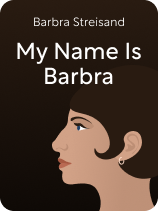

This article is an excerpt from the Shortform book guide to "My Name Is Barbra" by Barbra Streisand. Shortform has the world's best summaries and analyses of books you should be reading.
Like this article? Sign up for a free trial here.
How old was Barbra Streisand when she first played on Broadway? Did she win a Tony for Funny Girl?
Barbra Streisand is one of those rare talented and versatile performers who’s earned the top awards in film, television, theater, and music. In her autobiography My Name Is Barbra, she discusses her remarkable Broadway career.
Keep reading to learn some highlights of Barbra Streisand on Broadway from her memoir.
Barbra Streisand on Broadway
The debut of Barbra Streisand on Broadway came early in her career, but it wasn’t where she started. Streisand got her first acting credits at the age of 15 as an apprentice at Malden Bridge Playhouse. Her first role was a small part in a play called Teahouse of the August Moon.
(Shortform note: The factual details of Streisand’s career are readily available. Therefore, we focus mainly on what she says about her personal experiences as a performer rather than reiterating all of the specific roles she played.)
That same summer, Streisand played a flirtatious office worker and a plain, bookish girl; though those roles were very different from each other, she received positive reviews for both. Streisand says that she felt miscast in some of the roles she played during her apprenticeship, but she didn’t care—she was just happy to finally be onstage.
(Shortform note: Even though Streisand felt she’d been miscast in her apprenticeship roles, the fact that she got positive feedback for two very different parts meant that she’d avoided being typecast. This is when actors are repeatedly cast in the same kind of role, such as how John Wayne played numerous versions of a rugged, manly cowboy. Many actors fear being typecast because having to play the same kind of character over and over can feel like it’s suffocating their creativity.)
With the support of her manager Martin “Marty” Erlichman, Streisand landed her first Broadway role at the age of 19: a young secretary named Miss Marmelstein in the play I Can Get It for You Wholesale.
(Shortform note: According to Jerome Weidman, who wrote Wholesale, the unusual choice to cast 19-year-old Streisand as middle-aged secretary Miss Marmelstein was made out of necessity. Streisand was such an exceptional performer that they absolutely had to cast her, but she had such a big personality and presence that she’d steal scenes if she were only in the ensemble, thereby ruining the show. Therefore, casting her as Marmelstein—a major character, but not a main character—gave her a chance to shine onstage while still allowing more experienced performers to play the leading roles.)
In 1964, Streisand starred in Funny Girl as legendary vaudeville performer Fanny Brice. She adds that she was competing with some of the biggest names of the day for that part, including Carol Burnett and Anne Bancroft; being cast over such popular stars was proof of Streisand’s stardom.
(Shortform note: Although she’d been competing with some of the most popular performers on Broadway, some reviews of Funny Girl made it seem as though casting Streisand was a foregone conclusion. For example, one glowing review—before praising nearly every aspect of Streisand’s performance—said that she was the next best thing to reviving Brice herself to play the role.)
Streisand adds that she was nominated for Tony Awards for both of the aforementioned shows, but she didn’t win. However, in 1970, she was presented with a Special Tony Award for Star of the Decade. She says that award moved her deeply because it came from the theater community, which she’d come to view as her family.
(Shortform note: The Special Tony Awards are noncompetitive awards that the organization gives to recognize exceptional achievements in theater. By giving Streisand such an award, they were acknowledging that—though she hadn’t won either of the individual, competitive awards that she was nominated for—she’s a remarkable performer who deserved their recognition and acclaim.)

———End of Preview———
Like what you just read? Read the rest of the world's best book summary and analysis of Barbra Streisand's "My Name Is Barbra" at Shortform.
Here's what you'll find in our full My Name Is Barbra summary:
- The autobiography of Barbra Streisand, a rare EGOT winner
- Streisand's childhood, romantic relationships, and extensive career
- Why Streisand began singing despite having little to no formal training






